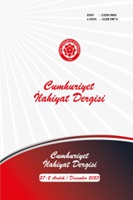Kavramsal, Tarihsel ve Pratik Açıdan Dinden Dönme ve İnanç Özgürlüğü
Conceptual, Historical and Practical Aspects of Apostasy and Freedom of Belief
Author(s): Faruk Sancar, Rıza KorkmazgözSubject(s): Social Philosophy, Philosophy of Religion, History of Islam, Sociology of Religion, History of Religion
Published by: Cumhuriyet Üniversitesi İlahyat Fakültesi
Keywords: Kalam; Force; Free Will; Apostasy; Apostate; Religious Freedom;
Summary/Abstract: The rapid change in the world after the Enlightenment not only brought about revolutionary scientific and technological innovations, but also opened the door to important transformations in the context of thought. Especially with the wind created by the French Revolution, some concepts such as equality, fraternity, and justice, which were already in circulation before, came to the fore even more. One of the concepts that was magnified in this process was freedom. The concept manifested itself in philosophy as an understanding of free will against the idea of determinism, and in politics as independence against oppressive governments. Since the day it was addressed as an independent topic, it has attracted attention with its different types and aspects, including freedom of the press, freedom of thought, freedom of expression, freedom of religion and conscience. We see that the intellectual adventure of the Western world in the last two centuries has been shaped around these concepts. The libertarian attitude, which at first manifested itself as a rebellion against religious and secular authorities, was later driven to extremes that saw itself as independent from all moral and social norms. These debates were inevitably reflected in the field of theology, and topics such as the position of the will of man against God’s will, fate and the problem of evil were reconsidered according to contemporary claims and objections. The atheistic tendencies that emerged in the Western world claimed that all religions deprive man of the possibility of being an active subject on earth and that a person who believes that all his/her actions are known and determined cannot be truly free. This point is actually one of several important issues that contemporary atheism raises against theism. These debates have also reached the Islamic world and the issue continued to be addressed with similar arguments. At its core, each of these claims rests on the assumption that Islam's conception of the human being leaves no room for individual freedom. Although the problem has different aspects such as fate and theodicy, one of the most striking aspects of the problem is the question of whether man has the right to reject Islam as well as the right to enter Islam by one’s own free will. It is important to answer this question. Because some practices from the early period of Islamic history and the assumptions that apostates should be killed according to certain conditions, which are accepted as an established jurisprudence in Islamic law, have provided important opportunities for anti-Islamic ideas and ideologies. This article shows how the issue has been dealt with in the classical literature, while at the same time suggesting solutions on how to approach the phenomenon of conversion today. In addition, the study will show that the issue is dealt with in the context of public security in the fiqh literature, and therefore, the current cases of conversion or apostasy do not fully correspond to the discussions in the classical period.
Journal: Cumhuriyet İlahiyat Dergisi
- Issue Year: 27/2023
- Issue No: 2
- Page Range: 404-421
- Page Count: 18
- Language: Turkish

